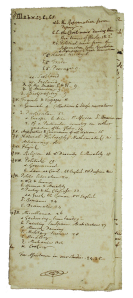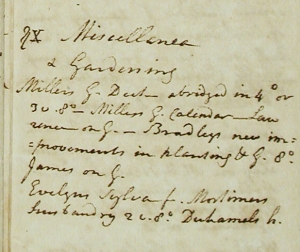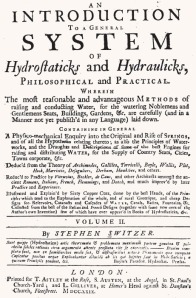Voted the Best Place to See by Condé Nast Traveler.

 An individual’s personal library has the potential to reveal significant information about their character, interests, worldview, and education. Such is certainly the case at Drayton Hall where research has identified what is likely a list of the titles that once graced the bookshelves of John Drayton (c.1715-1779), the builder of Drayton Hall. Written by son Charles Drayton (1743-1820), such a list contains more than 440 titles published before or during John Drayton’s lifetime, indicating his intellectual pursuits and attention to the ideals of the enlightenment.
An individual’s personal library has the potential to reveal significant information about their character, interests, worldview, and education. Such is certainly the case at Drayton Hall where research has identified what is likely a list of the titles that once graced the bookshelves of John Drayton (c.1715-1779), the builder of Drayton Hall. Written by son Charles Drayton (1743-1820), such a list contains more than 440 titles published before or during John Drayton’s lifetime, indicating his intellectual pursuits and attention to the ideals of the enlightenment.
Not surprisingly, the list of titles includes nine architectural pattern books that were undoubtedly utilized to construct Drayton Hall. Additional areas of interest include natural history, astronomy, landscape design, horticulture, dance, and even gastronomy. As research continues to investigate the titles of Drayton’s library, we anticipate that an increased understanding will be brought to Drayton, his educational opportunities, and academic pursuits.
This month, we are sharing our latest research on John Drayton’s library with a series of posts featuring some of the volumes he would have owned and read.

Horticulture Books
 Included in this listing for John’s library are several important works that exhibit methods on growing food crops, but also works devoted to pleasurable pursuits in ornamental gardens and landscape design. The Gentleman’s Recreation: the Art of Gardening Improved (1717) by John Laurence is an early book that likely illustrates John’s interests in the extravagant leisure gardens and fountains of a country gentleman. General System of Hydrostaticks and Hydraulicks (1729) by Stephen Switzer addresses the mechanics of water pressurization for such embellishments. Philip Miller’s Gardeners Dictionary (1731) and Kalendar (1732) were popular guides for growing plants for consumption, medicine, and profit. The use of a calendar system simplified the task of when to plant, tend to, and harvest in simplified terms which most gardeners, including John, might utilize to great advantage.
Included in this listing for John’s library are several important works that exhibit methods on growing food crops, but also works devoted to pleasurable pursuits in ornamental gardens and landscape design. The Gentleman’s Recreation: the Art of Gardening Improved (1717) by John Laurence is an early book that likely illustrates John’s interests in the extravagant leisure gardens and fountains of a country gentleman. General System of Hydrostaticks and Hydraulicks (1729) by Stephen Switzer addresses the mechanics of water pressurization for such embellishments. Philip Miller’s Gardeners Dictionary (1731) and Kalendar (1732) were popular guides for growing plants for consumption, medicine, and profit. The use of a calendar system simplified the task of when to plant, tend to, and harvest in simplified terms which most gardeners, including John, might utilize to great advantage.